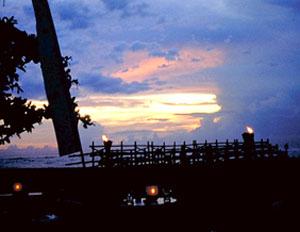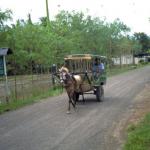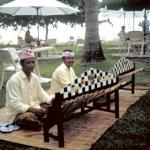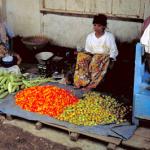Lombok -- Flowersongs And Desperation
With trepidation, we boarded the rickety, two prop, forty-four seat Fokker 27 that was supposed to take us from Bali to the neighboring island of Lombok. When the engines started revving, the plane began vibrating and we started shaking in fear. Through a cracked window, a member of the ground crew could be seen inspecting a liquid that was dripping from one engine; he dipped his finger into the puddle, tasted it, and then gave the thumbs up sign to the pilot. The plane did not sound right. The engines were hissing and knocking and sputtering; inside, the cabin rattled and clattered, and as we taxied down the runway, the roar grew louder, echoing like a train in a tunnel. Across the aisle, a corpulent Japanese man with a bulldog face sat trembling, his jowls flapping in resonance with the reverberating din.
As we ascended, the lights flickered off and on and there was an electrical crackle. I turned to my wife Doris and was about to holler something ill advised like, "We're going to die!" when she held up her hand, in protest.
"Don't interrupt. I'm praying," she yelled over the thunder.
Doors to the overhead compartments sprang open and bounced on their hinges; the windows vibrated and the seats shook. It sounded like a construction site. Instructions over the intercom were lost in the cacophony; the door to the cockpit flew open, slamming and banging.
Twenty-five minutes later, we were walking on still shaking legs across the tarmac, our ears still rumbling; we opened and closed our hands in an attempt to ease the cramps caused by the white-knuckle clenching.
It wasn't until some time later that we realized we had not traveled miles forward, but years backward. During the short flight, time had somehow wrinkled, warped, puckered and folded back on itself.
* * * * *
A common means of transportation in Lombok is by cidomo, horse-drawn carts with benches seating up to ten passengers. The horse is allowed to set its own gait, unhurried by the driver; the image suggests an apt metaphor for Lombok's unrushed pace.
There is an unaccustomed smell to Lombok, like air charged with ions after a lightning storm, like the scent of innocence, made more precious by the knowledge that purity is ephemeral; the petals will inevitably fall.
Lombok's model for prosperity is the tourist mecca across the strait. In Bali, the once predominant rain forests succumbed first to agriculture before being sacrificed to the dollar god of tourism. Lombok is inexperienced, but quickly learning from big brother Bali.
* * * * *
Along Sengiggi Bay, the Nener fishermen walk chest deep in the gentle sea pushing scoop nets; they will sell the almost invisible minnows to a hatchery in Jakarta. Two boys no older than nine sit smoking in the shade of an outrigger fishing boat; their hands are stretched out for a tip in unison after agreeing to be photographed. A massage lady in a conical hat offers her services with a smiling, "I give you good massage, you bet!" A girl sells papayas and bananas which are in a basket carried on her head. One man is sorting through coral that has washed ashore, placing certain pieces in a bucket; when questioned, he draws a rough outline of a house in the sand.
Vendors of wooden masks and statues, T-shirts, tablecloths, sarongs, woven bracelets, silver rings and knock-off watches stroll the beach ever watchful, thronging around tourists like fish to food. Each attempts to promote a sale with a hard luck story -- "My baby is very sick." "My children are hungry." "My mother is in the hospital and I have to buy medicine." Each attempts to strike a sympathetic nerve. Across the strait, rising above mists and myths, is Mt. Agung, home of Bali's last cloud forest.
* * * * *
On a walk along Sengiggi Beach, we were approached by a young man with a wide smile and severely pockmarked face. "How are you?" he said in a carefully enunciated greeting and when we asked the same of him, he replied with an even bigger grin, "I am happy. I am always happy." When we told him we were from Canada and asked him if he knew where Canada was, he replied, "I know it in my ears." He had little understanding of world geography.
Our new friend gestured toward the seascape backed by green hills; "Magnificent. It is magnificent. Did I say correct?" His name was Urip and we soon discovered that he was teaching himself English by learning a new word from a dictionary after each of his five daily prayers. Like the majority on Lombok, Urip was a Muslim.
We learned that he was 29, married, had two young daughters, and lived in a house he built himself out of coconut palm, bamboo, and thatch; there was no running water, no electricity. Urip made his living as a freelance guide, supplementing his income by picking coconuts or planting and harvesting rice. Some days, Urip informed us, he made the equivalent of about $4 US and sometimes he made nothing for days at a time. "My average is one dollar a day. Did I say correct?" He repeated the word average, lingering on each syllable. By learning English Urip felt he had an advantage over other would be guides. "I will reign," he confided, pronouncing the second to last letter.
* * * * *
We were at an outdoor seaside restaurant, awaiting the sunset. About one hundred feet out to sea, waves heaved, curled and boomed against a coral reef. The salt air mingled with the scent of frangipani. Two strolling musicians wearing sarongs spread a mat on the sand, placed down the two small gamelan instruments they carried, sat behind them with crossed legs and, as their wands magically danced over the hollow bamboo, filled the twilight with intricate rhythms of liquid melody, like water trickling over rocks.
* * * * *
"This morning I have a very good word," announced Urip. "Talkative. I am very talkative. Did I say correct?" He grinned proudly.
As we walked, Urip talked freely about his life. He had never been off the island. Born into a fisherman's family, he left school at age ten at his father's insistence. He contracted smallpox that went untreated for over a year because the family could not afford a doctor. Shortly after he was finally treated, he left home and changed his name from Mohammed to Urip. "It means 'life again'," Urip explained.
We stopped at a ramshackle beach store to buy a package of the clove-based Indonesian cigarettes called Kretek. When Urip learned what we were charged, he shook his head; pointing at a government stamp on the bottom of the pack, he explained that we had been charged double the price. "It is not honest," he commented sadly, pronouncing the "h".
* * * * *
"Hello Flowers," Urip said to Doris who was surrounded by a phalanx of relentless beach vendors. He used the nickname he also used for his own wife and presumably all females. "They are desperation," he explained, indicating the vendors. "Did I say correct?"
* * * * *
"Will you teach me a word?" Urip asked.
'Integrity' came to mind immediately, and we gave it to him, explaining the meaning. He repeated the word slowly, breaking it into syllables. Finally, he smiled and announced, "I have it in my heart." And in your soul, we thought.
* * * * *
Before we went searching for wooden statues at the Sweta market, the largest in Lombok, Urip cautioned us about the possible duplicity of some vendors. "Sometimes they will use shoe polish to darken wood from the mango tree and then say it is expensive mahogany. Mahogany wood is very heavy."
The Sweta market is sprawling, hectic, smelly, and noisy. Within the labyrinthine alleys of the complex can be found handicrafts, fruits, vegetables, hardware, textiles, leather goods, dried and fresh fish, rice, beef and poultry. We looked over a large selection of carved statues; the variety and sizes made choices difficult. During the inevitable haggling, the vendor praised the quality of the wood. "But it is special mahogany, imported from Kalimantan," he assured us. Then, to bolster his argument, he pleaded, "Please raise your price a little more; my son needs an operation."
* * * * *
We hired Urip as our guide and planned a tour of the island's major sites. Greeting us in the hotel lobby with a wide grin, he informed us of the latest addition to his English word-hoard -- "pouring rain". He repeated the words, savoring them like a poet. The sky was dark and threatened a storm. "I hope it doesn't pouring rain," Urip said, looking at the sky.
As we set off, he turned to us in the back seat and welcomed us formally, "Good morning flowers and gentlemens; I would like to introduce our driver for today's tour of magnificent Lombok," he chuckled infectiously while the driver grinned at us through the rear view mirror.
Our first stop was at Labuapi, a woodcarving village just outside the capital, Mataram. The owner led us up steep rickety stairs to where a group of carvers worked without looking up. "I have something very special," the storeowner said, unlocking a cabinet and taking out an object wrapped in cloth. "It is very old," he announced as he showed us a "book" which looked like about one hundred tongue depressors strung together with leather thongs, covered with cryptic writing. "It is written in Sanskrit and tells the history of Lombok. It is over 250 years old!" he stated, his eyebrows arched for emphasis. His asking price was $300 US which quickly became 200 and then 100. As we left, the price was $50 and then $25. "I take Visa," he shouted as we walked out the door.
"It was not real," Urip confided glumly. "He is not a honest man." It had begun to rain lightly.
We visited the Lingsar temple built in 1714 by the first migration of Balinese Hindus; Urip explained that both Hindus and Muslims make offerings and sacrifices here to ensure bountiful harvests. As we left, we were asked to make a donation for the upkeep of the temple. Urip later explained that the site was maintained by the government and that the money would be pocketed.
At Narmanda, we strolled through a vast complex of pools and terraced gardens dating from 1805 and once used as the king's summer palace. A guide who followed us uninvited, pointed out a locked bathhouse fed by a spring that flowed from Mt. Rinjani, Lombok's highest mountain, and said to guarantee youth. "I'm over a hundred," quipped the teenage guide. When we left, he requested a tip for this item of information. Urip looked at the ground.
As we drove through the countryside flanked by rice fields, the rain shower became a downpour. Within minutes the rice paddies became overflowing lakes. The road was flooded and the car created waves splashing a scurrying couple who were using a banana leaf as an umbrella.
Children who had been working in the fields took off their clothes and transformed the deluge into a waterpark, wallowing, whooshing, and splashing as they squealed and screamed, phantoms in the misty evaporation.
At Sengkol, we visited a native Sasak village with its characteristic high arched huts and floors of packed cow dung, clay, and mud. A local guide took us into one cramped hut; two women watching television seemed unaware of our presence. Outside two cows were being led to a barn, their hooves sluicing through the puddly and mucky lane. As we left, we were asked to sign a guest book with neatly ruled columns for name, date, and country; the last column was headed "donation". Walking us back to the car, the guide explained that the donation did not include his tip. The downpour intensified.
"Is this raining cats and dogs or is it pouring rain?" Urip questioned seriously.
An amusing incident occurred at Sukarare, a weaving village where skills and traditional patterns are passed from mother to daughter. A girl of about seven working a handloom gestured for me to come closer. When I approached, she started feeling my beard with curiosity. The girl at the next loom also copped a feel. It occurred to me that I had seen no others with beards and that mine was perhaps the first the girls had seen.
The rain was torrential; the windshield wipers flapped uselessly. Although there were other stops on our itinerary--the pottery village of Penujak and the "monkey road" to Baun Pusak--the roads were flooded and in places washed out. Urip seemed especially disappointed that we couldn't see the monkeys. "Our monkeys are polite, not like on Bali."
That evening it was still pouring; we sat on the verandah of our thatched-roofed sea front bungalow at the Sengiggi Beach Hotel and watched the light show that was flashing over the strait in the direction of Bali. The thunder rumbled and boomed like a volcano; shards of lightning slashed and sliced. We wondered whether the Balinese gods were angry or jealous. The lawn was hopping with hundreds of toads.
* * * * *
On the day of our departure, there was an uneasiness apparent with Urip. There was no smile; we assumed it was just the emotion of saying good-bye. Then came his announcement.
"Last night was very bad." Urip began. "My Flower's father died. And my oldest daughter fell down the well. She spent the night in the hospital. The doctor said she should stay another day, but it is very expensive."
* * * * *
As we awaited transportation to the airport, the gamelan musicians appeared in the hotel lobby. Within seconds, the night air rippled and cascaded with flowersong.
 ThingsAsian
ThingsAsian




















